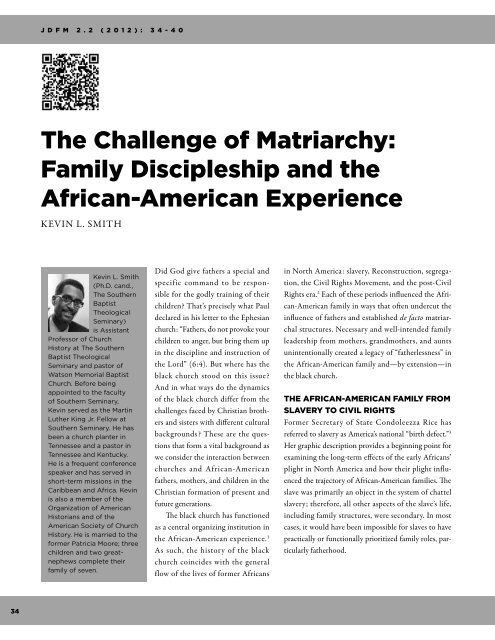here - The Southern Baptist Theological Seminary
here - The Southern Baptist Theological Seminary
here - The Southern Baptist Theological Seminary
You also want an ePaper? Increase the reach of your titles
YUMPU automatically turns print PDFs into web optimized ePapers that Google loves.
J DFM 2.2 (2012): 34-40<br />
<strong>The</strong> Challenge of Matriarchy:<br />
Family Discipleship and the<br />
African-American Experience<br />
KEVIN L. SMITH<br />
Kevin L. Smith<br />
(Ph.D. cand.,<br />
<strong>The</strong> <strong>Southern</strong><br />
<strong>Baptist</strong><br />
<strong>The</strong>ological<br />
<strong>Seminary</strong>)<br />
is Assistant<br />
Professor of Church<br />
History at <strong>The</strong> <strong>Southern</strong><br />
<strong>Baptist</strong> <strong>The</strong>ological<br />
<strong>Seminary</strong> and pastor of<br />
Watson Memorial <strong>Baptist</strong><br />
Church. Before being<br />
appointed to the faculty<br />
of <strong>Southern</strong> <strong>Seminary</strong>,<br />
Kevin served as the Martin<br />
Luther King Jr. Fellow at<br />
<strong>Southern</strong> <strong>Seminary</strong>. He has<br />
been a church planter in<br />
Tennessee and a pastor in<br />
Tennessee and Kentucky.<br />
He is a frequent conference<br />
speaker and has served in<br />
short-term missions in the<br />
Caribbean and Africa. Kevin<br />
is also a member of the<br />
Organization of American<br />
Historians and of the<br />
American Society of Church<br />
History. He is married to the<br />
former Patricia Moore; three<br />
children and two greatnephews<br />
complete their<br />
family of seven.<br />
Did God give fathers a special and<br />
specific command to be responsible<br />
for the godly training of their<br />
children? That’s precisely what Paul<br />
declared in his letter to the Ephesian<br />
church: “Fathers, do not provoke your<br />
children to anger, but bring them up<br />
in the discipline and instruction of<br />
the Lord” (6:4). But w<strong>here</strong> has the<br />
black church stood on this issue?<br />
And in what ways do the dynamics<br />
of the black church differ from the<br />
challenges faced by Christian brothers<br />
and sisters with different cultural<br />
backgrounds? <strong>The</strong>se are the questions<br />
that form a vital background as<br />
we consider the interaction between<br />
churches and African-American<br />
fathers, mothers, and children in the<br />
Christian formation of present and<br />
future generations.<br />
<strong>The</strong> black church has functioned<br />
as a central organizing institution in<br />
the African-American experience. 1<br />
As such, the history of the black<br />
church coincides with the general<br />
flow of the lives of former Africans<br />
in North America: slavery, Reconstruction, segregation,<br />
the Civil Rights Movement, and the post-Civil<br />
Rights era. 2 Each of these periods influenced the African-American<br />
family in ways that often undercut the<br />
influence of fathers and established de facto matriarchal<br />
structures. Necessary and well-intended family<br />
leadership from mothers, grandmothers, and aunts<br />
unintentionally created a legacy of “fatherlessness” in<br />
the African-American family and—by extension—in<br />
the black church.<br />
THE AFRICAN-AMERICAN FAMILY FROM<br />
SLAVERY TO CIVIL RIGHTS<br />
Former Secretary of State Condoleezza Rice has<br />
referred to slavery as America’s national “birth defect.” 3<br />
Her graphic description provides a beginning point for<br />
examining the long-term effects of the early Africans’<br />
plight in North America and how their plight influenced<br />
the trajectory of African-American families. <strong>The</strong><br />
slave was primarily an object in the system of chattel<br />
slavery; t<strong>here</strong>fore, all other aspects of the slave’s life,<br />
including family structures, were secondary. In most<br />
cases, it would have been impossible for slaves to have<br />
practically or functionally prioritized family roles, particularly<br />
fatherhood.<br />
34
















